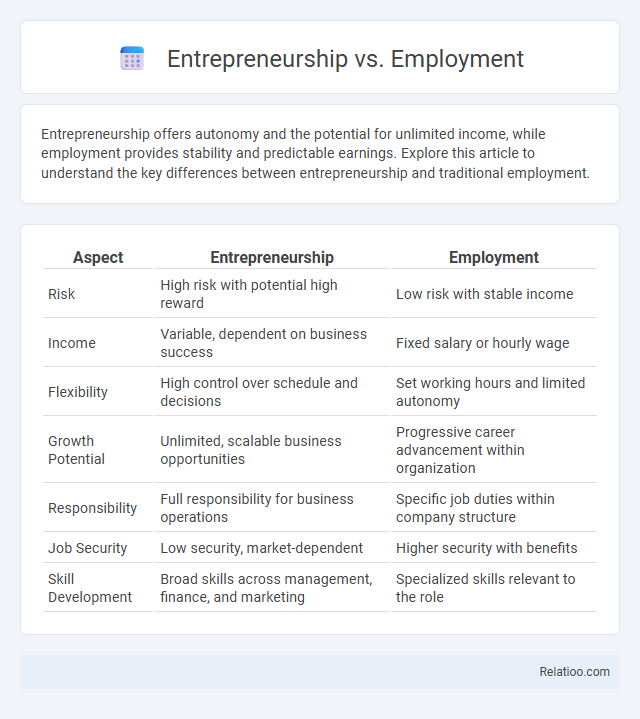Entrepreneurship offers autonomy and the potential for unlimited income, while employment provides stability and predictable earnings. Explore this article to understand the key differences between entrepreneurship and traditional employment.
Table of Comparison
| Aspect | Entrepreneurship | Employment |
|---|---|---|
| Risk | High risk with potential high reward | Low risk with stable income |
| Income | Variable, dependent on business success | Fixed salary or hourly wage |
| Flexibility | High control over schedule and decisions | Set working hours and limited autonomy |
| Growth Potential | Unlimited, scalable business opportunities | Progressive career advancement within organization |
| Responsibility | Full responsibility for business operations | Specific job duties within company structure |
| Job Security | Low security, market-dependent | Higher security with benefits |
| Skill Development | Broad skills across management, finance, and marketing | Specialized skills relevant to the role |
Understanding Entrepreneurship and Employment
Understanding entrepreneurship involves recognizing it as the process where you create, develop, and manage a business venture to generate profit while taking on financial risks. Employment typically refers to working for an organization or individual in exchange for a salary or wages, often with defined roles and responsibilities. Both paths require distinct mindsets: entrepreneurship demands innovation and risk tolerance, whereas employment offers stability and structured career growth, which plays a crucial role in effective career planning.
Key Differences Between Entrepreneurs and Employees
Entrepreneurs drive innovation by creating and managing new businesses, assuming significant financial risks and making strategic decisions that impact company growth. Employees typically follow established organizational structures, performing specific roles with defined responsibilities and receiving steady compensation and benefits. Your choice between entrepreneurship and employment depends on your risk tolerance, desire for autonomy, and long-term career goals.
Pros and Cons of Entrepreneurship
Entrepreneurship offers the potential for high financial rewards, independence, and creative control, yet it carries risks such as financial instability, long working hours, and uncertainty. Unlike traditional employment, entrepreneurs face the challenge of securing funding, managing all business aspects, and bearing full responsibility for failures. Your decision to pursue entrepreneurship should weigh the trade-off between autonomy and the security offered by established career paths and employment.
Advantages and Disadvantages of Employment
Employment offers structured income stability and benefits such as healthcare and retirement plans, providing financial security for your daily needs. However, rigid work schedules and limited autonomy can hinder personal growth and creativity, potentially causing dissatisfaction. Balancing the reliability of employment with the desire for independence is crucial in your career planning.
Required Skills for Entrepreneurs vs Employees
Entrepreneurs require skills such as innovation, risk management, strategic thinking, and adaptability to navigate uncertain markets and drive business growth. Employees benefit from expertise in collaboration, task execution, time management, and following structured processes to meet organizational goals. Your career planning should assess these skill sets to align with whether you thrive in self-driven entrepreneurial ventures or structured employment environments.
Risk Factors in Entrepreneurship and Employment
Entrepreneurship involves high risk factors such as financial instability, market uncertainty, and the responsibility of business success, whereas employment offers more stable income with fewer direct risks but less control over job security. Career planning minimizes risks by aligning individual skills and market demands, promoting long-term growth and adaptability in both entrepreneurial and employed paths. Understanding these risk factors is crucial for effective decision-making and sustained professional development.
Financial Considerations: Income and Stability
Entrepreneurship often offers higher income potential but comes with significant financial risks and income instability due to fluctuating profits and market uncertainties. Employment typically provides a steady paycheck, benefits, and financial stability, making it a safer option for predictable income and long-term financial planning. Your choice should weigh the trade-off between the guaranteed stability of employment and the potential financial rewards and risks of entrepreneurship within your overall career planning.
Work-Life Balance: Entrepreneur vs Employee
Entrepreneurs often face unpredictable hours and intense workloads that can challenge maintaining a healthy work-life balance, whereas employees typically benefit from more structured schedules and defined boundaries between work and personal time. Career planning for both paths involves assessing your priorities for flexibility versus stability, as entrepreneurs may sacrifice immediate balance for long-term autonomy, while employees might trade some freedom for consistent downtime. Understanding these differences helps you tailor your approach to achieve optimal work-life harmony aligned with your personal and professional goals.
Career Growth and Opportunities
Entrepreneurship offers you the potential for rapid career growth through innovation and risk-taking, fostering opportunities to build businesses and create jobs. Employment provides stable career progression within established organizations, with structured development programs and clear promotion paths. Career planning integrates both approaches, enabling strategic decisions that align your skills and goals with emerging market trends to maximize long-term growth and opportunities.
Choosing the Right Path: Factors to Consider
Choosing the right path between entrepreneurship, employment, and career planning requires evaluating personal risk tolerance, financial stability, and long-term goals. Entrepreneurship demands innovation, resilience, and the ability to manage uncertainty, while employment offers structured income and benefits with clear job roles. Effective career planning incorporates skill development, market demand analysis, and alignment with individual values to ensure sustainable professional growth.

Infographic: Entrepreneurship vs Employment
 relatioo.com
relatioo.com